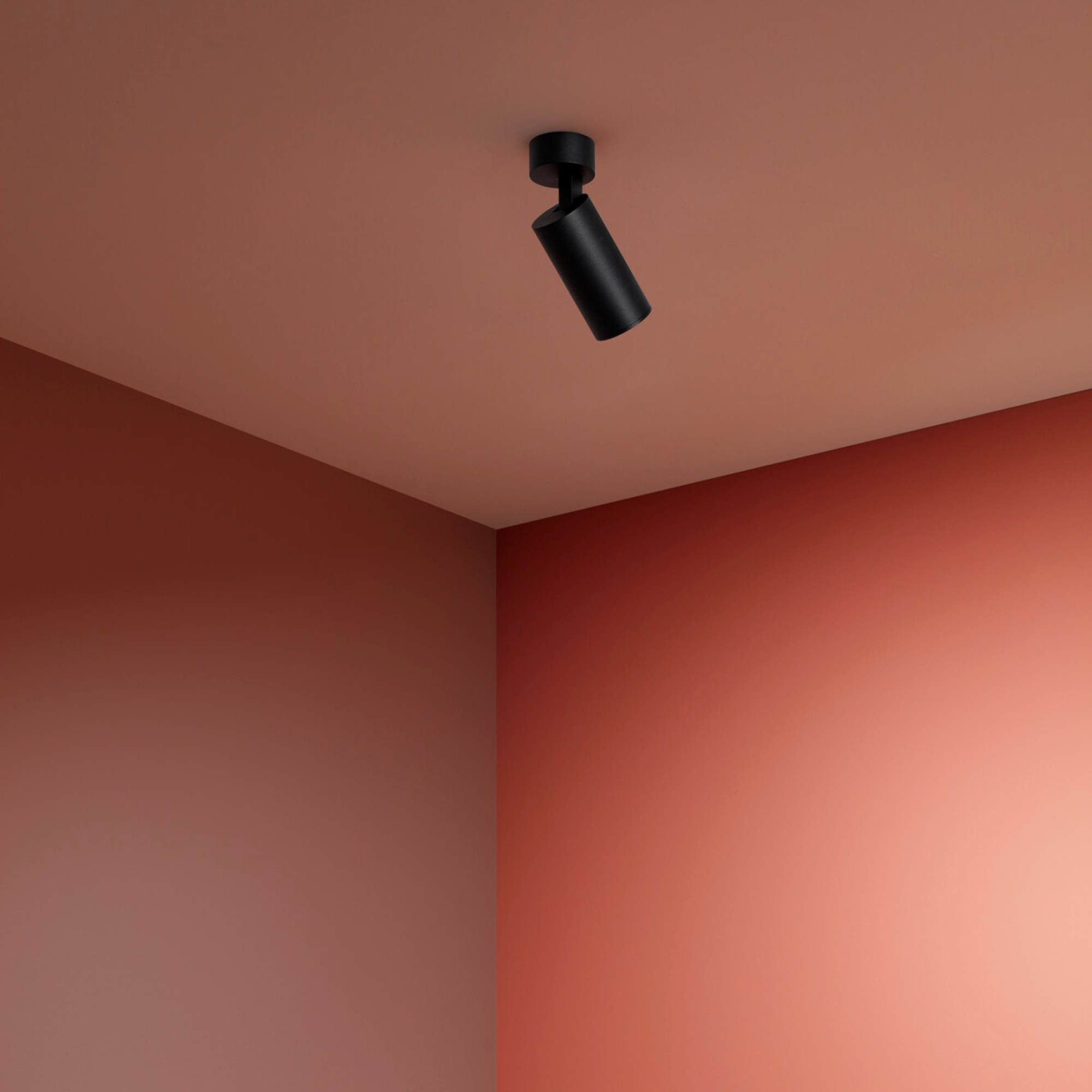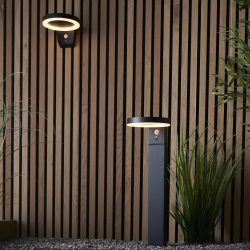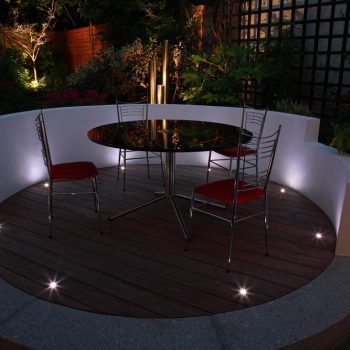If you’re shopping for garden lights, you will inevitably come across solar lights as an option, but are they worth it? In this guide to solar lights, we will answer some of the most frequently asked questions on owning solar lights, including their advantages and disadvantages, explaining if they work in winter and how to maintain them.
As professional lighting experts, we can help you decide if solar lighting is worth your investment and help you get the most out of your solar lights with regular maintenance. Here is everything you need to know before and after you buy solar lights.
Table of contents
- How do solar garden lights work?
- What are the advantages of solar lights?
- What are the disadvantages of solar garden lights?
- Are solar garden lights worth it?
- Will solar lights charge in winter in the UK?
- Do solar lights charge on rainy days?
- How long do solar garden lights last?
- Why don’t solar garden lights last long?
- What to do when garden solar lights stop working.
How do solar garden lights work?
Solar garden lights feature solar panels that absorb energy from the sun. The photovoltaic cells in the panels create a chemical reaction that converts light from the sun to energy and stores it in rechargeable batteries.
The solar lights will charge in the sunlight during the day and illuminate at night. Solar lights also have light sensors, which measure the light level around them. When it gets dark, the sensors tell the light to switch on so it doesn’t waste energy during the day. These are often called dusk-till-dawn solar lights.
What are the advantages of solar lights?
There are some noteworthy advantages to investing in solar lights.
Energy-saving and eco-friendly
As solar lights use renewable energy from the sun to charge their batteries, they are the kindest outdoor lighting option for the environment.
Cost efficiency
Because solar lights use the sun’s energy to illuminate, there is no extra cost to your energy bills.
Easy install
Finally, as solar lights don’t require plugging into outlets or hardwiring into the mains circuit, you don’t need any special skills to install these lights in your garden. Nor is there any need to hire a professional electrician.
What are the disadvantages of solar garden lights?
Inevitably, there are also disadvantages to solar lights.
The cost
You can get a significant range of prices for solar lights, but be aware that the cheaper ones are less effective and may not last as long as they contain lower-grade materials. If you want good quality solar lights, purchase them from a highly regarded brand at a higher price point to get the best output and longevity.
Changing batteries and maintenance
There is a level of maintenance for solar lights to work at their best. For example, you must keep them clean. Dirt and debris on the solar panel prevent the light from getting to the solar panels. You will also need to change the batteries every one to three years if the output quality decreases.
Seasonal effectiveness
Any solar light will not perform as effectively in winter compared to summer, no matter the quality. In the summer, the solar lights can potentially benefit from the sun’s rays between 7 am and 9 pm, that’s nearly 14 hours. Whereas in the UK winter, you can only expect the sun between 9 am and 4 pm, which is only seven hours of sun! With the potential for worse or cloudy weather, solar lights have less chance to charge in winter and may not shine as bright at night.
Subject to environment
Even in summer, if you don’t point your solar lights towards the sun or something obstructs the solar light, like a shadow from the house or a tree, your lights won’t charge enough.
Are solar garden lights worth it?
Deciding if solar lights are worth it depends on what you want to use them for. If you want a collection of decorative solar lights to create a cosy environment for your summer BBQs and light pathways in the summer, they’re 100% worth it. But, if you intend to light a larger area all year round, you may have to invest in a high-quality solar light that can charge on limited sunlight during the winter or look at different options like battery or mains-powered lights. Also, it isn’t worth getting solar lights if your location or garden doesn’t get that much sunlight.
Will solar lights charge in winter in the UK?
On average, solar lights need around 8-10 hours of direct sunlight to completely charge their batteries to work at night. Many solar lights can sufficiently get this amount through the winter, especially if you get bright, crisp winter days.
However, if you have an extended period of cloudy weather, your solar lights will seem dimmer at night as they don’t have enough sunlight to charge. And if snow falls and settles on the solar panels, it won’t be able to recharge its batteries.
Do solar lights charge on rainy days?
Similarly, if you have rainy weather, the solar lights can charge to some extent using the light coming through the clouds, but it won’t be enough to produce a bright light at night.
How long do solar garden lights last?
Solar lights can last up to five years with proper maintenance.
Why don’t solar garden lights last long?
There are various reasons why your solar garden lights don’t last long, and it’s due to how you maintain them.
Cleaning
Solar garden lights don’t last as long if you let them get dirty in the garden. Inevitably, they will get some dirt on them, but regular cleaning will prevent dust and dirt from entering the mechanism and degrading the light. Use a damp cloth and mild dish soap to remove excess dirt from your solar light.
Water-resistant vs waterproofing
Determine if your solar lights are water-resistant or waterproof. If they’re water resistant, you can’t submerge them, or they will break. Waterproof solar lights will prevent water penetration, but if they get exterior damage, their waterproofing can become compromised. If you know your solar lights are only water resistant and you have harsh, rainy weather, it’s best to store them to protect them.
Correct storage
Incorrect storage can also damage solar lights. Prolonged storage periods will compromise their ability to recharge. So ensure you don’t store them for more than three days. Or, you can turn them off or remove their batteries to protect them.
Replace the batteries
Your batteries will likely run out faster than the solar light. So remember to replace the batteries if the quality starts to reduce.
What to do when your garden solar lights stop working?
Just because your solar light is not functioning as it should doesn’t mean it’s broken. There could be several reasons why your solar light has stopped working, and there are a few fixes you can try.
Try cleaning it
If your solar lights stop working, try cleaning the panels. Dirt and dust will prevent light from getting to the receivers and charging the light.
Replace the batteries
Solar light batteries wear out after a couple of years. Try replacing them and see if it works.
Reposition the light
Your solar light may not be receiving the amount of sunlight it needs to charge. Try repositioning it so it can receive the most sunlight throughout the day. The best position is south-facing.
Try turning it off and giving it a boost.
Your solar light may be out of charge, especially after a dark, cloudy winter. Try turning the light off for 72 hours and allow it to charge without wasting energy.
Move away from artificial light.
Your light might not work because it’s too close to a garden or street light. Solar lights have light sensors that make them turn on when it gets dark. But, if it’s close to artificial light, it may think it’s daytime.
Solar lights at Moonlight Design
You should now be able to make an informed decision about whether solar lights are ideal for you or not. It all depends on what you want to use them for. And if you already have them, you will know how to take care of them and ensure they last for years. Why not browse our extensive range of solar lights here at Moonlight Design and find the perfect solar lights for your garden?
Related blogs





Leave a comment
This site is protected by hCaptcha and the hCaptcha Privacy Policy and Terms of Service apply.